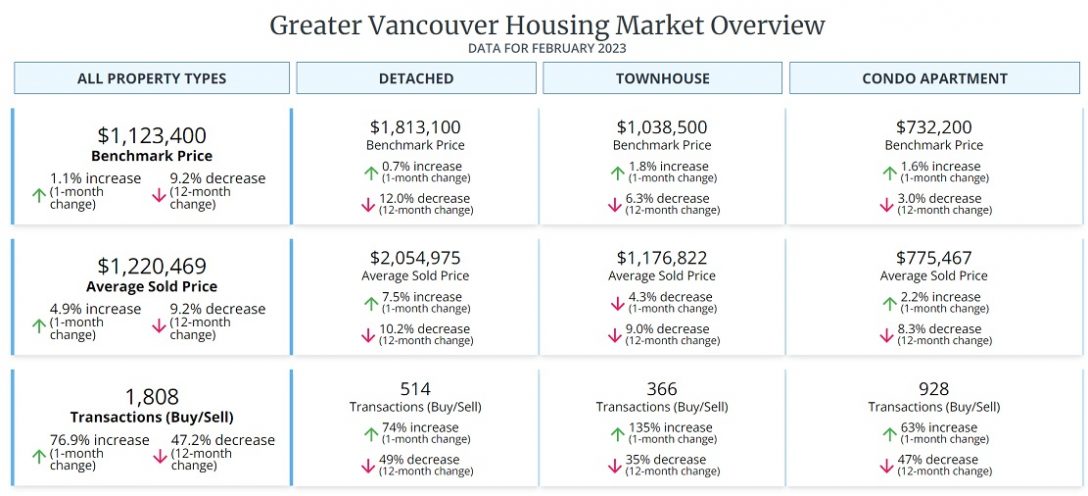Market Report Summary for February 2023
• The average home price in Greater Vancouver was $1,220,469, which declined by 9.2% annually while increased 4.9% monthly.
• The benchmark price of homes in Metro Vancouver stands at $1,123,400, representing a 1.1% monthly increase and a 9.2% yearly decrease in February 2023.
• This benchmark price exhibits a 21% increase over three years but is 11% lower than the all-time high of $1,264,700 in April 2022.
• Since January 1st, British Columbia homebuyers can back out of a home purchase up to three days after the sale.
• Detached home benchmark prices decreased by 12.0% year-over-year to $1.81M.
• Townhouse benchmark prices decreased by 6.3% year-over-year to $1.04M.
• Condo apartment benchmark prices decreased by 3.0% year-over-year to $732k.

In February 2023, 1,808 Vancouver homes were sold. These sales include 514 detached homes, 928 apartments and 366 attached homes. The average home price in Greater Vancouver was $1,220,469. This represents an annual decrease of 9.2% and a monthly increase of 4.9%.
In February 2023, the average sale price of detached houses, attached houses and apartments in Greater Vancouver was $2,054,975, $1,176,822 and $775,467, representing 7.5%, -4.3% and 2.2% change relative to January 2023, respectively. These prices also represent annual changes of -10%, -9%, and -8.3%.
The benchmark price of homes in Metro Vancouver was $1,123,400 in February 2023, a 1.1% monthly increase and a 9.2% decrease year-over-year. Metro Vancouver and the Toronto area are the most expensive Canadian housing markets.
Vancouver has been a costly housing market for years, and its current benchmark price has only increased by 6.9% over the past five years, while CPI inflation has been 17% over the past five years. Toronto’s competition with Vancouver regarding home unaffordability is relatively recent, as Greater Toronto benchmark home prices have climbed by 43% over the past five years. This whopping 5-year growth is despite an 18% price decline since the peak in Toronto home prices in February 2022.
Benchmark prices of detached homes in Vancouver fell 12% over the past year but rose 0.7% over the past month to reach $1,813,100 for February 2023. Over the past three years, Vancouver detached homes’ benchmark price has increased by $338k. This three-year price gain can buy a home in the Edmonton area.
Vancouver townhouse benchmark price is $1,038,500, down 6.3% year-over-year but up 1.8% month-over-month in February 2023. Apartment benchmark prices decreased 3% year-over-year and increased 1.6% month-over-month to $732,200.
Looking at Metro Vancouver’s housing market, there were 7,868 active listings at the end of February 2023, up 17% compared to last year and 5.2% compared with 7,478 listings at the end of January 2022. The 3,467 new listings this month is a 37% decrease year-over-year and a 5.2% increase compared with January 2022.
The 1,808 home sales this month are 47% lower year-over-year. This puts Vancouver’s sales-to-active listings ratio at 23%. There are about 960,000 houses in the Vancouver area, and the benchmark home price in Vancouver has increased by 194k over the last three years. Thus the wealth of Vancouver homeowners has increased approximately by $194k*960k or about $186 billion over the previous three years. This massive increase in housing wealth has occurred despite 960k*141k or about $135 billion of housing wealth being wiped out since April last year, just in the Vancouver Metropolitan Area.
The Bank of Canada (BoC) announced a pause in hiking rates on January 25th. The February rise in price and activity seems to be the result of this pause. We think this is premature as currently, BoC’s policy rate is restrictive, and we are a few quarters away from any cut in rates. As a result, the current burst of activity is unlikely to sustain and the housing market is very likely to cool again.
The provincial government of British Columbia has started a very interesting experiment. The Property Law Amendment Act and the Home Buyer Rescission Period Regulation have just come into effect. When for example, buying a home in Ontario or buying a home in Alberta, the moment a house seller accepts a buyer’s offer or the buyer accepts a seller’s counteroffer, we have a legally binding contract. But as a result of these two changes, when buying a house in British Columbia, the buyer can cancel the sale by paying a quarter of a percent of the purchase price to the seller up to three days after the sale.
The idea behind this new law seems to allow the buyer to perform a home inspection and ensure their ability to finance the purchase even if they have not conditioned their offer on inspection or financing. But this might have much more profound implications for the British Columbia housing market.
One thing frequently occurs during asset bubbles is people getting excited about entering the market. As a result of this excitement, they are very likely to decide their offer price based on emotion. With a cooling-off period in effect, the buyer can rethink their offer after the purchase when the excitement of getting into the market has likely passed.
Overpaying buyers would more likely face buyer’s remorse and cancel their purchase. Though limitation on supply (often imposed by municipal by-laws) might cause rises in prices, this new law has the potential to make a house price bubble inflation less likely.
Vancouver Housing Market Report by WOWA


Recent Comments